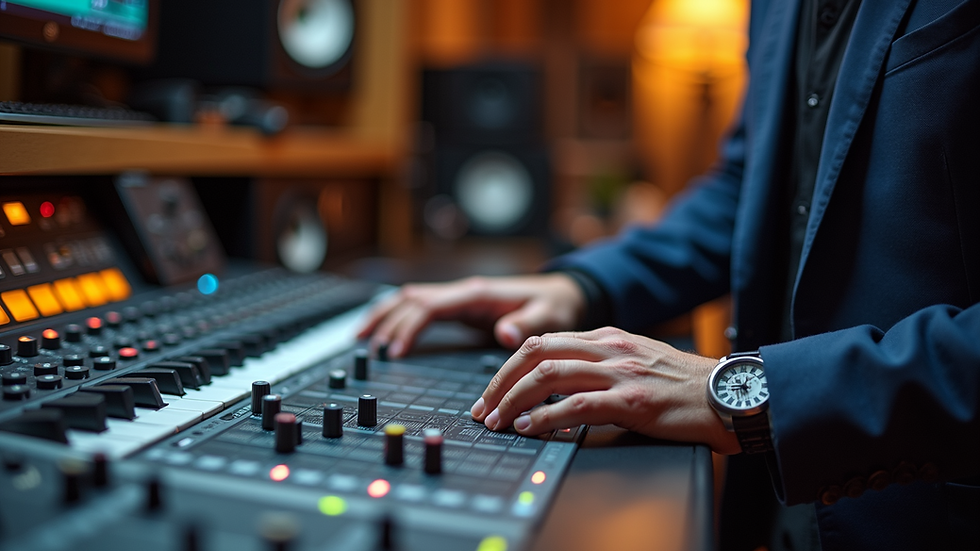Elevate Your Sound: Mastering Services for Artists
- jvonjackson13
- Jul 24, 2025
- 5 min read
In the world of music, sound is everything. It can make or break a track. As an artist, you pour your heart and soul into your music. You want it to shine, to resonate with listeners, and to stand out in a crowded market. This is where mastering services come into play. Mastering is the final step in the music production process, and it can elevate your sound to new heights.
In this blog post, we will explore what mastering is, why it is essential for artists, and how to choose the right mastering service for your needs. Whether you are a seasoned musician or just starting, understanding the importance of mastering can help you create music that truly connects with your audience.
What is Mastering?
Mastering is the process of preparing and transferring recorded audio from a source to a data storage device. This process ensures that your music sounds polished and professional. It involves adjusting the final mix to enhance the overall sound quality.
Here are some key aspects of mastering:
Equalization (EQ): This involves adjusting the balance of frequencies in your track. It helps to ensure that no frequency range is overpowering or lacking.
Compression: This process reduces the dynamic range of your audio. It makes the quiet parts louder and the loud parts quieter, creating a more balanced sound.
Limiting: This is a form of compression that prevents your audio from clipping. It ensures that your track can be played at high volumes without distortion.
Stereo Enhancement: This technique widens the stereo image of your track, making it sound fuller and more immersive.
Mastering is not just about making your track louder. It is about making it sound its best across all playback systems, from headphones to car stereos.
Why is Mastering Important?
Mastering is crucial for several reasons:
Professional Sound: A well-mastered track sounds polished and professional. It can make a significant difference in how your music is perceived.
Consistency: Mastering ensures that all the tracks on your album or EP have a consistent sound. This is important for creating a cohesive listening experience.
Compatibility: A mastered track will sound good on various playback systems. Whether someone is listening on a high-end speaker or a smartphone, your music should translate well.
Industry Standards: The music industry has certain standards for sound quality. Mastering helps you meet these standards, making your music more competitive.
Emotional Impact: A well-mastered track can evoke emotions more effectively. It enhances the listening experience, allowing your audience to connect with your music on a deeper level.
How to Choose the Right Mastering Service
Choosing the right mastering service can be a daunting task. Here are some tips to help you make the best choice:
1. Research Different Services
Take the time to research various mastering services. Look for reviews and testimonials from other artists. This can give you insight into the quality of their work.
2. Listen to Samples
Most mastering services will have samples of their work available. Listen to these samples to get a feel for their style and quality. Pay attention to how the tracks sound across different playback systems.
3. Consider Your Budget
Mastering services can vary widely in price. Determine your budget before you start looking. Remember, you often get what you pay for, so be cautious of services that seem too cheap.
4. Check Their Experience
Look for mastering engineers with experience in your genre. Different genres have different sound requirements. An engineer who specializes in rock may not be the best choice for electronic music.
5. Communication
Good communication is key. Reach out to the mastering service and ask questions. A responsive and helpful team can make the process smoother.
The Mastering Process: What to Expect
Once you choose a mastering service, you will typically go through the following steps:
1. Submission of Your Mix
You will need to submit your final mix to the mastering engineer. Make sure it is the best version of your track.
2. Initial Review
The mastering engineer will listen to your track and provide feedback. They may suggest changes or improvements before starting the mastering process.
3. Mastering
The engineer will begin the mastering process, applying EQ, compression, limiting, and other techniques to enhance your track.
4. Review and Revisions
After the initial mastering is complete, you will receive a preview of the mastered track. You can provide feedback and request revisions if necessary.
5. Final Delivery
Once you are satisfied with the final product, the mastering service will deliver the mastered track in the desired format.
Common Mistakes to Avoid
When it comes to mastering, there are some common mistakes that artists often make. Here are a few to watch out for:
Rushing the Process: Mastering is an important step. Take your time to ensure it is done right.
Skipping Mastering: Some artists believe they can skip mastering and still achieve a professional sound. This is a mistake. Mastering is essential for a polished final product.
Over-Processing: It can be tempting to apply too many effects during mastering. Less is often more. Focus on enhancing the natural sound of your track.
Ignoring Feedback: If you receive feedback from the mastering engineer, take it seriously. They have the experience to guide you in the right direction.
The Future of Mastering Services
As technology continues to evolve, so does the world of mastering. Here are some trends to watch for:
Automated Mastering: With advancements in AI, automated mastering services are becoming more popular. While they can be convenient, they may lack the personal touch of a human engineer.
Home Mastering: More artists are learning to master their own music at home. While this can save money, it requires a good understanding of the process and the right tools.
Collaboration: Many artists are choosing to collaborate with mastering engineers remotely. This allows for a broader range of options and styles.
Real-Life Examples of Successful Mastering
To illustrate the importance of mastering, let’s look at a few successful artists who have benefited from professional mastering services.
Example 1: Billie Eilish
Billie Eilish is known for her unique sound. Her tracks are meticulously mastered to create an intimate listening experience. The mastering process has helped her music stand out in a competitive industry.
Example 2: Ed Sheeran
Ed Sheeran’s music is a great example of how mastering can enhance emotional impact. His tracks are mastered to ensure that every note resonates with listeners, creating a powerful connection.
Example 3: Tame Impala
Tame Impala’s psychedelic sound relies heavily on mastering. The intricate layers of their music are expertly balanced through the mastering process, allowing each element to shine.
Tips for Artists on a Budget
If you are an artist on a budget, there are still ways to achieve great sound quality. Here are some tips:
DIY Mastering: Consider learning the basics of mastering. There are many online resources and software available that can help you get started.
Collaborate with Friends: If you have friends who are experienced in audio production, consider collaborating with them for mastering.
Look for Discounts: Some mastering services offer discounts for independent artists. Keep an eye out for promotions.
Focus on Your Mix: A great mix can make mastering easier. Spend time perfecting your mix before sending it off for mastering.
Final Thoughts
Mastering is a vital step in the music production process. It can elevate your sound and help you connect with your audience. By understanding the importance of mastering and choosing the right service, you can ensure that your music stands out in a crowded market.
Remember, your music is a reflection of you. Invest the time and resources needed to make it the best it can be. With the right mastering, your sound can truly shine.



Comments